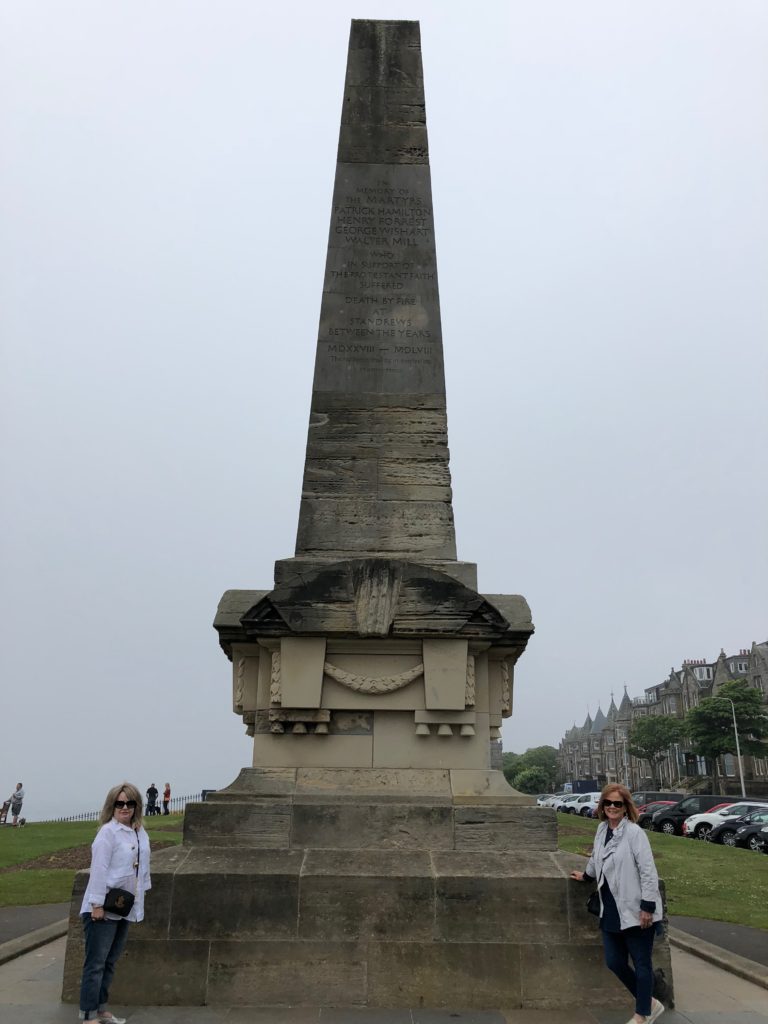
We are back home now.
When we got off the plane the warm air felt good.
I realized I had acclimated to the cool climate of Scotland, where 55 degrees Fahrenheit felt warm, not as acclimated though as my Scottish playing partner at Royal Dornoch who wore a short sleeve polo on a windy mid-50s day.
Similarly, by the time of Wycliffe, and then Tyndale and Knox, England and Scotland had become acclimated to a corrupt, lifeless, church, so much so that Cardinal Beaton felt comfortable living openly in St. Andrews Castle with his mistress and eight illegitimate children.
It took men like Wycliffe, Tyndale, and Knox, who took their cues from the Lord and His Word rather than from culture to see so clearly what others who had looked at corruption and lifeless religion for so long could no longer see.
When I think about the take-aways from this trip, I think of these men and the others—Patrick Hamilton, George Wishart, John and Charles Wesley, William Wilberforce, Queen Bertha, Augustine of Canterbury, Columba, and Cuthbert—and what enabled them shape the course of history and advance the kingdom of God in such spectacular fashion.
Three characteristics come to mind.
First, they did not love their lives even unto death. They made themselves fully available to King Jesus to be used as He willed. Hamilton, Wishart, Knox, and Augustine either gave or risked their lives in obedience to King Jesus. This is the declaration from heaven John records in Revelation 12:10-11, that they overcame by the blood of Jesus, their testimony, and not loving their lives even to death. The death most of us must be willing to face and accept today is not that which comes through martyrdom but to self. The latter is less open and obvious, but just as necessary if we are to be useful to King Jesus in changing the world. We must all be martyrs.
Second, they were bold. They did not fear man. I think of what James Douglas, 4th Earl of Morton and newly elected regent of Scotland said at Knox’s grave: “Here lies one who never feared any flesh.” When Knox was called before Mary, Queen of Scots, he did not back down but told her he would continue to preach the Word. Wilberforce told men what they did not want to hear and persuaded them to ultimately do away with the slave trade in Great Britain.
Third, they shared King Jesus’s heart for reaching the lost and making disciples. Augustine made the long journey from Rome to Kent in the hopes of a evangelizing an England ruled by a pagan king. Bertha no doubt influenced her husband, King Aethelbert, toward the Gospel. Columba set out across Scotland to make disciples of the ferocious Picts neither the English nor the Romans could ever fully defeat militarily. Cuthbert did the same.
When The Wife and I left Nashville this morning, Dr. H was preparing to go to the office where he would pick back up his job devising, managing, and implementing church growth strategies. Tomorrow I will go back to my job as a trial lawyer serving King Jesus as an instrument for justice on the earth. And all four of us will go back to reaching the lost and making disciples.
On such things the kingdom of God depends. GS
